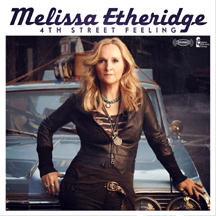Melissa Etheridge (born May 29, 1961) is an American rock singer-songwriter, guitarist, and activist. Her self-titled debut album Melissa Etheridge was released in 1988 and became an underground hit. In 1993, she released what would become her mainstream breakthrough album, Yes I Am. The album featured three Top 40 hits, including “I’m the Only One” (No. 8) and “Come to My Window” (No. 25), the latter which scored Etheridge her second Grammy award. In October 2004, Etheridge was diagnosed with breast cancer, and underwent surgery and chemotherapy. At the 2005 Grammy Awards, she made a return to the stage and, although bald from chemotherapy, performed a tribute to Janis Joplin with the song “Piece of My Heart”. In 2007, she won an Academy Award for Best Original Song for “I Need to Wake Up” from the film An Inconvenient Truth. In September 2011, Etheridge received a star on the Hollywood Walk of Fame. (More from Wikipedia)
Melissa Etheridge rose to rock stardom in the 1980’s and was one of the first prominent lesbians in any field of entertainment. Also, VH1 had a series of Duets programs where Etheridge was paired with newer female singers, including Joan Osborne, Sophie B. Hawkins, Jewel and Paula Cole. Each of these performers has had a solid career with several hit albums. After awhile, so many fine female performers were on the music scene that one of them, Sarah McLachlan organized a touring music festival featuring female singers or female-led bands called Lilith Fair. The festival ran from 1997 to 1999 and was revived in 2010.
Melissa Etheridge paved the way for greater acceptance of gays in the greater American society and, not incidentally, opened the door for other lesbian musicians like Phranc, whom I have heard described as “everyone’s favorite Jewish lesbian folksinger”.
(October 2013)
* * *
In the article about Cris Williamson in Allmusic, William Ruhlmann offers this concise introduction: “Just as baseball historians can only speculate about how players in the old Negro leagues would have fared in the absence of segregation in the major leagues prior to the arrival of Jackie Robinson in 1947, so music historians may ponder what status Cris Williamson might have assumed if she had emerged at a time when admitted homosexuals were not subject to exclusion from major record labels. By the 1990’s, openly gay women artists Melissa Etheridge, Indigo Girls, and k.d. lang were able to maintain major-label contracts and sell records in the millions (although none of them had proclaimed their sexual orientation when they were signed in the 1980’s).” * * * Olivia Records was conceived as a recording company that would be geared to gay women, but as discussed below, it was more than just that. However, women’s music is not overtly sexual, or at least I have never heard any that was. For the most part, the romantic songs are addressed to the lover; as with Melissa Etheridge, the gender is beside the point, lending the music appeal to all listeners. However, women’s music is not overtly sexual, or at least I have never heard any that was. For the most part, the romantic songs are addressed to the lover; as with Melissa Etheridge, the gender is beside the point, lending the music appeal to all listeners.
(January 2014) * * * The album name Relish sums up Joan Osborne’s views on life in general; here is Roch Parisien’s take on the album as a whole (via Allmusic): “Grounded in blues, soul and gospel, the Kentucky native wields her gritty voice with personality and forceful presence, kind of Melissa Etheridge meets Sophie B. Hawkins with a splash of Jann Arden. Osborne’s passion for life oozes from the grooves. There’s an uplifting fervor to her material and delivery, as if every second, every note was being individually savored.”
(November 2014)
* * *
Dreamgirls created drama at the Oscars that year to match what was being portrayed on the screen. Despite not being nominated for Best Director or Best Picture (or any nominations for Best Actor or Best Actress either, for that matter), Dreamgirls had the most Academy Award nominations in 2007 with eight – a first at the Academy Awards. In a rare feat for an actor in a debut role, Jennifer Hudson was named Best Supporting Actress, but Eddie Murphy’s loss to Alan Arkin (for his role in the quirky and delightful comedy Little Miss Sunshine) as Best Supporting Actor was regarded as an upset. Three of the songs from Dreamgirls were nominated for Best Song, but they also lost out to the Melissa Etheridge song “I Need to Wake Up” from the Al Gore documentary film, An Inconvenient Truth.
(April 2015/1)
Olivia Records was conceived as a recording company that would be geared to gay women, but as discussed below, it was more than just that. However, women’s music is not overtly sexual, or at least I have never heard any that was. For the most part, the romantic songs are addressed to the lover; as with Melissa Etheridge, the gender is beside the point, lending the music appeal to all listeners. However, women’s music is not overtly sexual, or at least I have never heard any that was. For the most part, the romantic songs are addressed to the lover; as with Melissa Etheridge, the gender is beside the point, lending the music appeal to all listeners.
The album name Relish sums up Joan Osborne’s views on life in general; here is Roch Parisien’s take on the album as a whole (via Allmusic): “Grounded in blues, soul and gospel, the Kentucky native wields her gritty voice with personality and forceful presence, kind of Melissa Etheridge meets Sophie B. Hawkins with a splash of Jann Arden. Osborne’s passion for life oozes from the grooves. There’s an uplifting fervor to her material and delivery, as if every second, every note was being individually savored.”
(November 2014)
* * *
Dreamgirls created drama at the Oscars that year to match what was being portrayed on the screen. Despite not being nominated for Best Director or Best Picture (or any nominations for Best Actor or Best Actress either, for that matter), Dreamgirls had the most Academy Award nominations in 2007 with eight – a first at the Academy Awards. In a rare feat for an actor in a debut role, Jennifer Hudson was named Best Supporting Actress, but Eddie Murphy’s loss to Alan Arkin (for his role in the quirky and delightful comedy Little Miss Sunshine) as Best Supporting Actor was regarded as an upset. Three of the songs from Dreamgirls were nominated for Best Song, but they also lost out to the Melissa Etheridge song “I Need to Wake Up” from the Al Gore documentary film, An Inconvenient Truth.
(April 2015/1)















